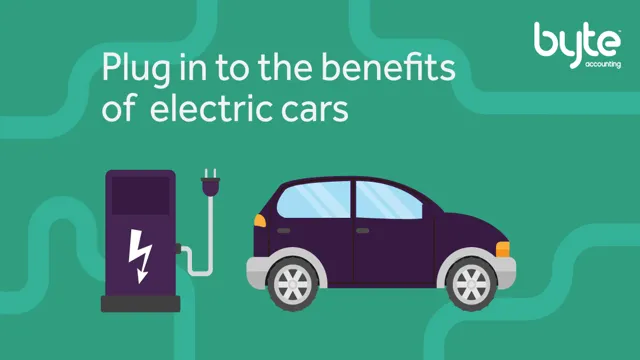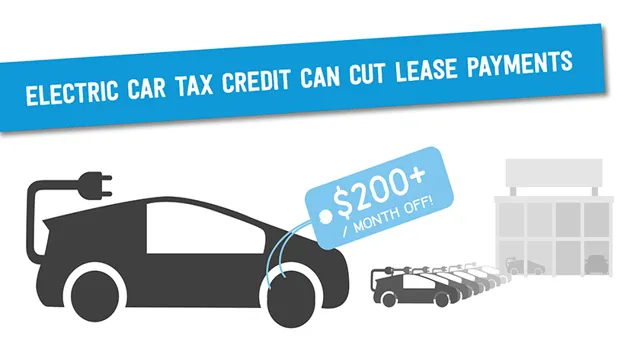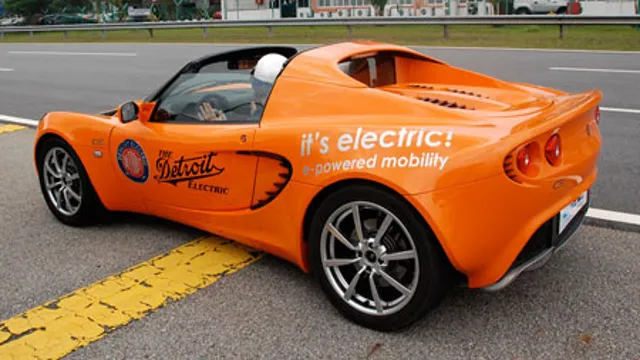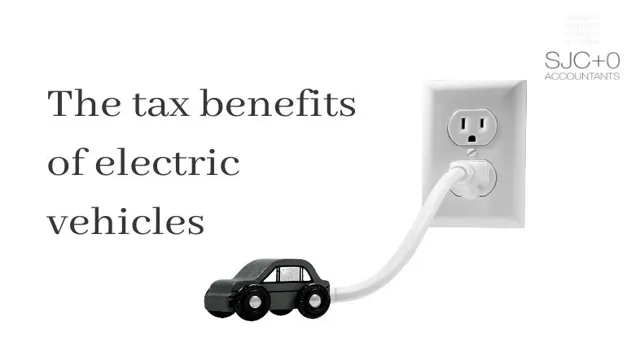Revolutionize Your Drive: The Top Benefits of Switching to Electric Cars
Electric cars have been growing in popularity in recent years, as people start to realize the benefits they offer both environmentally and economically. These vehicles run on electric motors powered by batteries that can be recharged. Unlike gasoline engines, electric cars do not emit harmful gases that contribute to global warming or cause air pollution, making them a more sustainable option.
In addition to being environmentally friendly, electric cars are also cheaper to operate and maintain than traditional cars that run on fossil fuels. With the advancements in technology, electric cars are becoming more affordable and accessible to the masses. So, if you are contemplating purchasing an electric car, keep reading to discover the many benefits and advantages that these vehicles offer.
Environmental Benefits
Electric cars offer a range of environmental benefits that make them an increasingly popular choice for eco-conscious drivers. Perhaps the most significant advantage of electric cars is that they produce lower emissions than their gasoline-powered counterparts. This means that electric cars can help reduce air pollution, which has a direct impact on human health.
In addition to producing lower emissions, electric cars are also much more energy-efficient, meaning they require less energy to operate. This translates to fewer greenhouse gas emissions, which can help mitigate climate change. And because electric cars don’t rely on fossil fuels, they also reduce our dependence on oil and other non-renewable resources.
This not only helps preserve the environment, but it also ensures energy security in the long term. All in all, the benefits of using electric cars make them an attractive choice for environmentally conscious drivers who want to do their part in reducing their carbon footprint.
Reduced emissions and carbon footprint
Reduced emissions and carbon footprint are some of the most significant environmental benefits that come with adopting sustainable practices. When we reduce our emissions, we can significantly reduce our carbon footprint. This is because carbon dioxide is a major greenhouse gas that is responsible for global warming and climate change.
By reducing the amount of carbon dioxide we emit, we can also help reduce the amount of other harmful gases such as methane and nitrous oxide that contribute to environmental degradation. When we adopt green energy practices such as solar or wind power, we replace fossil fuels that emit greenhouse gases during combustion with clean energy sources that do not produce any greenhouse gases. This helps to significantly reduce our carbon footprint and complement our efforts to reduce emissions.
Moreover, by promoting sustainable practices such as energy efficiency and waste reduction, we can reduce the amount of resources we consume, protect natural habitats, and ultimately, create a better future for the planet.
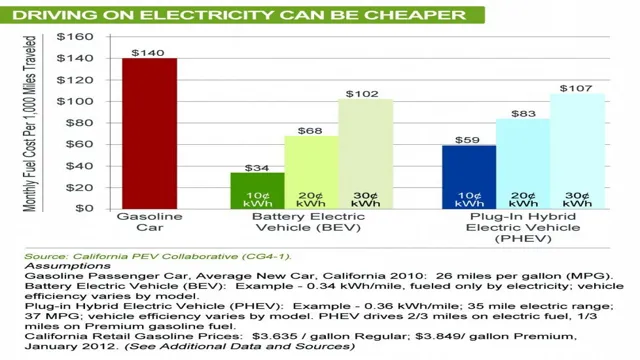
Decreased dependence on fossil fuels
Decreased dependence on fossil fuels brings a range of environmental benefits. By embracing alternative energy sources like solar, wind and hydro power, we can reduce our reliance on finite fossil fuels that contribute to climate change. This move away from traditional fossil fuels minimizes the harmful impact of greenhouse gas emissions and air pollution that are associated with oil and gas production.
Moreover, renewable energy technologies require less water than fossil fuel power plants, reducing the strain on water resources. As we continue to make strides in developing and implementing clean energy solutions, we can create a safer, healthier and more sustainable world for current and future generations. By integrating renewable energy into our daily lives, we make a positive impact on the environment and support the transition to a low-carbon economy.
Improved air quality
Improved air quality is one of the most significant environmental benefits we can enjoy. With cleaner air, we can breathe easier, and our health and well-being improve. The air pollution caused by industrial activities and transportation negatively affects people’s health, especially young children and the elderly.
However, with initiatives such as the use of renewable energy and the promotion of electric vehicles, we can reduce pollution levels and create a more sustainable and healthy environment. One way of achieving this is through community involvement in reducing greenhouse gas emissions and encouraging the adoption of cleaner technologies. By working together and taking steps towards cleaner air, we can positively impact our environment and the health of future generations.
So why not take action today and become part of the solution to improved air quality?
Cost Savings
When it comes to the benefits of using electric cars, one of the biggest advantages is the potential for cost savings. Electric vehicles (EVs) typically have lower operating costs than their gasoline counterparts, resulting in significant savings over time. For starters, the cost of electricity is much lower than that of gasoline, which means EVs have a lower fuel cost per mile.
Additionally, EVs require less maintenance than traditional vehicles, such as oil changes and engine tune-ups. This is because electric motors have fewer moving parts, resulting in less wear and tear over time. Furthermore, EVs are eligible for tax credits and other financial incentives, which can help offset the initial cost of purchasing the vehicle.
Overall, electric cars prove to be a wise investment that not only benefits our planet but also saves us money in the long run.
Lower fuel costs and maintenance expenses
As businesses try to cut costs and stay profitable, one area they are focusing on is reducing fuel expenses and maintenance costs. Thanks to technological advancements, companies can now invest in fuel-efficient and reliable vehicles that can ensure they save money in the long run. Lower fuel consumption means fewer trips to the gas station and, ultimately, a reduced cost to the business.
Additionally, modern vehicles come with advanced features that help minimize wear and tear, resulting in fewer breakdowns and less maintenance needed. Such savings can be significant for businesses that operate large fleets of vehicles. For example, a logistics company can save thousands of dollars by investing in fuel-efficient trucks that can move more goods with less fuel.
By reducing the cost of operations, companies can free up resources that can be invested in growth activities or used to reward employees. Ultimately, cost savings resulting from lower fuel and maintenance expenses help companies remain competitive and achieve their long-term goals.
Tax incentives and rebates
Tax incentives and rebates can provide significant cost savings for individuals and businesses. By taking advantage of tax incentives or rebates, you can reduce your overall tax liability or even receive cash back. Some common examples of tax incentives and rebates include energy-efficient home improvements, electric vehicle purchases, and solar panel installations.
While the availability and amount of these incentives and rebates will vary depending on your location and circumstances, they can help offset the initial cost of investments in more sustainable and eco-friendly options. By making these changes, you not only save money in the long run, but you also reduce your carbon footprint and contribute to a more sustainable future. As an individual, you can take advantage of tax incentives and rebates by researching available options and taking action accordingly.
For instance, purchasing an electric vehicle or installing solar panels on your home can provide significant tax savings. Similarly, energy-efficient home improvements like insulation, upgraded windows, and HVAC systems can also qualify for tax rebates. For businesses, tax incentives and rebates can also help provide cost savings and incentivize environmentally-friendly practices.
Some typical examples include tax credits for using renewable energy sources, purchasing renewable energy credits, or implementing energy-efficient practices in commercial buildings. These incentives and rebates can help offset any initial costs and ensure a higher return on investment in the long run. In conclusion, tax incentives and rebates can be excellent ways to reduce your overall tax liability and save money while promoting eco-friendly practices.
By taking advantage of available incentives and rebates, you can offset initial costs and continue to save money in the long run. It’s a win-win situation for everyone involved, and it’s a small but significant step towards creating a more sustainable future for our planet.
Convenience and Efficiency
One of the biggest benefits of using electric cars is their convenience and efficiency. Since they can be charged at home, electric cars eliminate the need to go out of your way to refuel at a gas station. This means that you can save time and money by simply plugging in your car overnight and waking up to a full charge.
Additionally, electric cars have fewer parts and require less maintenance, resulting in fewer trips to the mechanic and less maintenance costs. With the increase in charging infrastructure, it has become even easier to travel long distances without worrying about finding charging stations. Owning an electric car has never been more convenient and with the added benefit of reducing your carbon footprint, it’s no wonder why their popularity is on the rise.
Quieter and smoother ride
When it comes to getting from point A to point B, few things are as important as convenience and efficiency. This is especially true when it comes to transportation. That’s why it’s great news that modern cars are designed to provide a quieter and smoother ride than ever before.
Advanced suspension systems and sound insulation materials help to reduce road noise, while innovations like electric motors and hybrid powertrains offer a more efficient mode of transportation that saves on fuel costs. Whether you’re commuting to work or heading out on a road trip, these advancements in technology make for a more enjoyable and stress-free driving experience. So if you’re in the market for a new car, be sure to consider the latest models that prioritize both comfort and efficiency.
Your ears (and wallet) will thank you!
Charging at home and on the go
When it comes to electric cars, one of the biggest conveniences is the ability to charge at home. Simply plug your car into a charging unit installed in your garage and let it charge overnight while you sleep. This means no more trips to the gas station and no more waiting in line to fill up your car.
Plus, it’s much more efficient and cost-effective than constantly relying on public charging stations. But what about when you’re out and about? Luckily, there are more and more charging options popping up in public places such as malls, parking lots, and even on the street. With the help of apps and maps that show the location of charging stations, it’s easier than ever to find a spot to charge up your electric car on the go.
The keyword used in this paragraph is “charging”.
Modern and Stylish Design
Electric cars have been around for a while, but their popularity is growing rapidly these days. One of the biggest benefits of using electric cars is their modern and stylish design. Unlike traditional gas-powered cars, electric cars have sleek lines and a futuristic feel that is sure to turn heads.
Their clean and minimalistic design is perfect for those who appreciate modern aesthetics and want to make a statement. Furthermore, electric cars are often designed with sustainability in mind, which makes them even more attractive to eco-conscious consumers. Additionally, modern electric cars come equipped with many advanced features that make them even more convenient and efficient to use.
With their sophisticated designs and advanced functions, it’s no wonder that more and more people are choosing electric cars as their go-to mode of transportation.
Conclusion
Switching to electric cars not only benefits the environment but also offers a host of practical advantages. Not only do they save us money on gas and maintenance, but they offer a quieter, smoother ride that’s perfect for city driving. Plus, who doesn’t want to hop into a car that’s fully charged and ready to go every morning, without having to stop at a gas station? So, go ahead and make the switch to electric – you’ll be doing your part to save the planet, and enjoying some serious perks along the way!”
FAQs
What are the environmental benefits of using electric cars?
Electric cars emit less greenhouse gases and air pollutants than traditional gas-powered cars, helping to reduce air pollution and combat climate change.
How does using an electric car save money?
Electric cars have lower operating costs than gas-powered cars since they require less maintenance, have cheaper fuel costs, and often come with tax credits or incentives.
Can electric cars go the same distance as gas-powered cars?
Many modern electric cars can travel well over 200 miles on a single charge, making them viable options for long-distance travel.
What infrastructure is needed to support electric cars?
To support electric cars, infrastructure such as public charging stations and home charging units must be installed and maintained. Governments and private businesses are starting to invest in this infrastructure to encourage the adoption of electric cars.
